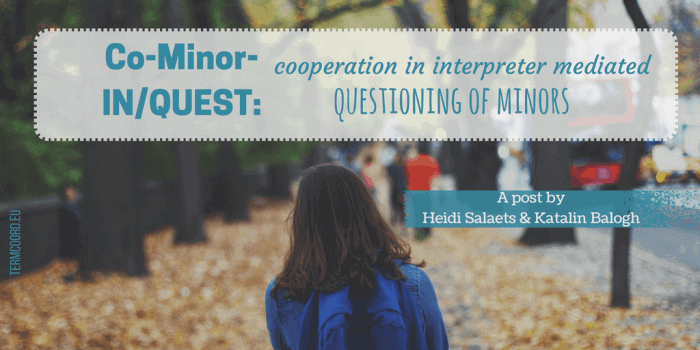Research in the field of interpreter-mediated interactions with children is starting to unfold under the umbrella of interpreting in the public services. Today we bring to you this post written by Heidi Salaets & Katalin Balogh from KU Leuven about their promising research, which aims to find out what are the needs and challenges to be addressed when interpreting for minors during an interview as part of a (pre-trial) criminal proceeding. Keep reading to learn more!

The interviewing of minors through an interpreter had been scarcely researched before the start of the Co-Minor-IN/QUEST project (JUST/2011/JPEN/AG/2961), even though a lot of research on questioning minors had been carried out by psychologists, training was offered to police officers to gain expertise in questioning minors and special attention was given to avoid secondary traumatisation of such minors in challenging situations (see Barnahus, an initiative coming from Iceland and implemented in considerable European member states and Child Advocacy Centers in the USA). However, until 2012 nobody was really thinking of the increased vulnerability experienced when a minor needs to express himself/herself in a different language, except for Lisa Aronson Fontes (2008: 111-166) and Beverley Costa (Mothertongue), and for the very recent work of researchers published in journals of Psychology, where they reflect on this challenging situation.
If we think about the number of refugees fleeing from war, violence, poverty or climate change, we cannot but pay special attention to the thousands of unaccompanied minors that are traveling – and arriving somewhere – alone, i.e. without the company of adults, such as parents, relatives or adult friends. In this context, the CO-Minor-IN/QUEST project was the first research project that focused on the interviewing children during the pre-trial phase of criminal proceedings, in particular in those cases where the assistance of an interpreter is needed. The CO-Minor-IN/QUEST project paid particular attention to vulnerable victims, suspects and witnesses under the age of 18 (vulnerable because of two reasons: age and native language) and looked into how to provide the necessary information, support and protection to this group. The project involved partner universities and organisations in six European countries: Belgium (KU Leuven), France (ISIT), Italy (Università di Bologna), Hungary (Eszter), the Netherlands (Ministerie van Veiligheid en Justitie, Raad voor Rechtsbijstand) and the United Kingdom (Heriot-Watt University).
This very specific setting of ImQM (Interpreter mediated Questioning of Minors) requires the cooperation of a multi-disciplinary team: behavioral scientists, psychologists, psychiatrists, legal actors (lawyers, police officers and examining magistrates) and interpreters (spoken and sign language). Teamwork is even more necessary when children are in situations of extreme vulnerability (e.g. in the case of mental or physical impairment, minorities, etc.). The project mainly focused on mapping for the first time the problems and needs in this particular field through an online survey. The more than 1000 respondents from the above-mentioned professional groups showed that there was/is indeed a lot of food for thought.
In this post we will summarise some of the main results of the survey, but those who want to have detailed information can get it from two sources. The materials were disseminated during the project’s final conference. Moreover, a free book was produced with the aim of raising awareness about this delicate matter and of formulating recommendations to all stakeholders and to other member states. Just like the project itself, this publication is the result of multidisciplinary teamwork with contributions from academics, interpreters (spoken and sign language), interpreter trainers, youth lawyers, police officers specialised in questioning minors, youth judges, forensic psychologists, child support workers, psychiatrists, children’s rights experts, an international family mediator and an expert in learning difficulties and intellectual disabilities.
Project results
If we want to draw –very briefly– one conclusion from the quantitative part of the survey, we can say that the various professionals involved in ImQM do not really know each other, nor do they now about each other’s expectations and professional boundaries and needs. This is specially the case for interpreters, who are usually the least known in the ImQM because too often some other professionals think (in a rather contradictory way) that, on the one hand, the interpreter is a machine that can translate “everything literally” and, on the other hand, that an interpreter is a person who can handle everything: cultural issues, technical terminology, gaining trust, building rapport, and so on.
These issues were addressed during the qualitative part of the survey (the narratives) were – as it is often the case – answers were more nuanced. If we had to highlight some key-themes from the narratives, we would choose professional quality (of all stakeholders involved), time and trust (i.e. trust of the child and trust amongst the different professionals in the ImQM). When they were asked about it, most professionals saw the need of more training and, if possible, of joint interprofessional training; where for instance a psychologist talks about child development, a police officer talks about his/her questioning techniques, a youth lawyer addresses his need for complete trust from the child, an interpreter about his/her role boundaries, and so on.
The second part of this research, the CO-Minor-IN/QUEST 2 project (JUST/2015/JTRA/AG/EJTR/8678, September 2016 – August 2018) is a follow up research project that builds on the main outcomes of the initial CMIQ 1. Within the framework of this project, researchers and members of the project consortium (the same partners, except for the UK which is replaced by Terre des Hommes, Hungary) want to develop a hands-on joint inter-professional training module for legal actors, (spoken and sign language) interpreters and forensic psychologists. For that purpose, 4 focus group discussions (one in each partner country, namely BE, FR, HU, IT) were organised with all different stakeholders involved in an ImQM in order to verify the needs that had come out of the large-scale survey of CMIQ1. In addition and for the first time, we asked the opinion of children themselves -through a unique interview approach- about their thoughts, needs, fears and experiences during an ImQM.
As for the rest of the general results, we can say that for the FGD (focus group discussion) that took place in Belgium –consisting of 8 members representing the professionals involved in ImQM– the conclusion was that other professionals want to have a clear idea about the role of the interpreter, mentioning transparency as a key word. The rights of the child are truly important and high quality professionals must guarantee them during an ImQM. The need for teamwork, respect for each other and trust in each other was particularly stressed, since the combination of these factors is the only way to obtain the trust of the minor. Without trust, the minor will not disclose information. Special attention was given to briefing each other before the interview, teamwork during the interview and debriefing afterwards. Joint inter-professional training is considered necessary to achieve all of the above, preferably through roleplays, and the exchange of information together with a change in attitude from all professionals involved in ImQM was also deemed necessary.
In order to summarise the opinions of the children, it is necessary to first briefly explain that the population used in the study was that of children, with different gender representation (M/F) and ages (from 5 to 17). They were invited to watch a short movie of 3 minutes about a (non-violent) pick-pocket scene. Next, an interviewer who did not speak or understand the language of the child asked non-suggestive open questions about what they had seen. An interpreter was present to interpret, consecutively or simultaneously (both modes were used). After a short break, children were then asked about their experiences while talking to somebody through an interpreter. For all children who participated in Belgium –except for a deaf child– it was a “first in-a-life-time-experience” and they all described it as a very positive one. Children had a clear preference for the seating arrangement in which the interviewer and interpreter were sitting next to each other (in front of the child) and they mostly preferred the consecutive mode. One of the most interesting results was the fact that children mostly addressed the interpreter when speaking, thought that the interpreter and interviewer were listening both to their story, but that the final trust of the child lied on the interpreter.
One of the biggest challenges found was the terminology that children use. This can of course not be easily found in a dictionary, glossary or term base. However, the interpreter should know all these words and interpret as literally -but mostly- as faithfully as possible. This was also one of the most stressed interviewers’ expectations with regard to interpreters. The interpreter is responsible for the language transfer, but it is up to the interviewer to decide on how to interpret the child-specific language.
The next steps in the Co-Minor-IN/QUEST II-project are the analysis of the feedback given by the participants and observers during the pilot interprofessional training in Antwerp on June 15th 2017, the publication of the manual with the joint training module, the production of an instruction video for stakeholders and an animation movie for children (from 2 different age groups) that explains -in a language independent way- how to proceed when, as a child, you need to tell a story but you don’t know the language of the place where you are.
 Written by Heidi Salaets & Katalin Balogh. Prof. dr. Heidi Salaets currently is the head of the Interpreting Studies Research Group at the Faculty of Arts of the University of Leuven (Campus Antwerp, Brussels and Leuven). At the Arts Faculty of the University of Leuven (Campus Antwerp), she teaches interpreting studies and trains interpreters (Italian-Dutch) both in the Master and in the EMCI (European Master in Conference Interpreting) postgraduate. On the same campus, she is also responsible for the evaluation procedure in the LIT-training (Legal Interpreters and Translators). Besides that, Heidi Salaets is assessor for the certification exams for community interpreters in Flanders and member of the CETRA (Cen
Written by Heidi Salaets & Katalin Balogh. Prof. dr. Heidi Salaets currently is the head of the Interpreting Studies Research Group at the Faculty of Arts of the University of Leuven (Campus Antwerp, Brussels and Leuven). At the Arts Faculty of the University of Leuven (Campus Antwerp), she teaches interpreting studies and trains interpreters (Italian-Dutch) both in the Master and in the EMCI (European Master in Conference Interpreting) postgraduate. On the same campus, she is also responsible for the evaluation procedure in the LIT-training (Legal Interpreters and Translators). Besides that, Heidi Salaets is assessor for the certification exams for community interpreters in Flanders and member of the CETRA (Cen tre for Translation Studies) staff, of the Board of ENPSIT (European Network for Public Services Interpreting and Translation) and of the Training and Accreditation Committee in ENPSIT. Since 2017, she represents the EMCI-programme of KU Leuven, Sint-Andries campus Antwerp in CIUTI (Conférence Internationale permanente d’Instituts universitaires de traducteurs et interprètes) which monitors quality control in interpreting and translation programmes worldwide. Dr. Katalin Balogh is the coordinator of the training on legal Interpreting and translation at the Faculty of Arts of the University of Leuven (Campus Antwerpen). She teaches Intercultural Studies for the students Master in Interpreting. Katalin Balogh was particolarly involved in the 3 AVIDICUS- projects (Assessment of Videoconference Interpreting in the Criminal Justice Service) see: http://wp.videoconference-interpreting.net/. Together with prof. dr. Abied Alsulaiman, she is responsable for the KU Leuven funded Folitex-project (Forensic Linguistic Tap Expert, former wiretap interpreting). Since 2012, Heidi Salaets works together with Dr. Balogh for different DG-Justice projects, as coordinator and/or as a partner.
tre for Translation Studies) staff, of the Board of ENPSIT (European Network for Public Services Interpreting and Translation) and of the Training and Accreditation Committee in ENPSIT. Since 2017, she represents the EMCI-programme of KU Leuven, Sint-Andries campus Antwerp in CIUTI (Conférence Internationale permanente d’Instituts universitaires de traducteurs et interprètes) which monitors quality control in interpreting and translation programmes worldwide. Dr. Katalin Balogh is the coordinator of the training on legal Interpreting and translation at the Faculty of Arts of the University of Leuven (Campus Antwerpen). She teaches Intercultural Studies for the students Master in Interpreting. Katalin Balogh was particolarly involved in the 3 AVIDICUS- projects (Assessment of Videoconference Interpreting in the Criminal Justice Service) see: http://wp.videoconference-interpreting.net/. Together with prof. dr. Abied Alsulaiman, she is responsable for the KU Leuven funded Folitex-project (Forensic Linguistic Tap Expert, former wiretap interpreting). Since 2012, Heidi Salaets works together with Dr. Balogh for different DG-Justice projects, as coordinator and/or as a partner.
Post prepared by Doris Fernandes del Pozo – Journalist, Translator-Interpreter and Communication Trainee at the Terminology Coordination Unit of the European Parliament.

Sources:
Websites
- Barnahus (Iceland, Europe). Available at: http://bit.ly/2tFqpWG (Accessed 19th July 2017)
- Child Advocacy Centre (USA). Available at: http://bit.ly/2u9noRT (Accessed 19th July 2017)
- Co-Minor-IN/QUEST Final Conference. Available at: http://bit.ly/2vBqXOS (Accessed 19th July 2017)
- Mothertongue (UK). Available at: http://bit.ly/2teTatQ (Accessed 19th July 2017)
- Costa, Beverley (2017) “The challenges of interpreting in mental-health settings”, TermCoord. Available at: http://bit.ly/2tEvWke (Accessed 19th July 2017)
Books and articles
- Balogh, K. & Salaets, H. (Eds.) (2015). Children and Justice: Overcoming Language Barriers. Cooperation in interpreter-mediated questioning of minors. Cambridge-Antwerp-Portland: Intersentia. Available at: http://bit.ly/2tphr4w (Accessed 19th July 2017)
- Costa, B. (2016). “Team Effort – Training Therapists to Work with Interpreters as a Collaborative Team”. International Journal for the Advancement of Counselling. DOI 10.1007/s10447-016-9282-7
- Fontes, L.A. (2008). Interviewing clients across cultures: a practitioner’s guide. New York: Guilford Press.
- Goodman-Delahunty, J. & Howes, L.M. (2017). “High-stakes interviews and rapport development: practitioners’ perceptions of interpreter impact”. Policing and Society. An International Journal of Research and Policy. Available at: http://bit.ly/2teD3fO (Accessed 19th July 2017)
- Houston, A. Russano, M.B. & Ricks, E.P. (2017). “’Any friend of yours is a friend of mine’: investigating the utilization of an interpreter in an investigative interview”. Psychology, Crime & Law. 23:5, 413-426. DOI: 10.1080/1068316X.2017.1290091. Available at: http://bit.ly/2vi7mUw (Accessed 19th July 2017)
- Powell, M.B., Manger, B., Dion, J. & Sharman, S.J. (2017). “Professionals’ Perspectives about the Challenges of Using Interpreters in Child Sexual Abuse Interviews”. Psychiatry, Psychology and Law. 24:1, 90-101.DOI:10.1080/13218719.2016.1197815. Available at: http://bit.ly/2tFTyAV (Accessed 19th July 2017)
